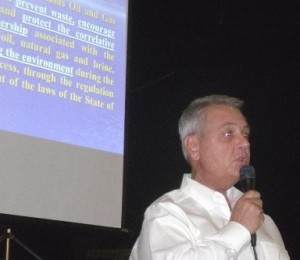South Arkansas landowners who may be unaccustomed to dealing with companies that want to lease or drill on their land for oil should arm themselves with information, Lawrence Bengal told about 50 people in Magnolia on Wednesday night.
Bengal, director of the Arkansas Oil and Gas Commission, spoke to area residents during a public meeting at the Magnolia Junior High School Auditorium. It was the second of two meetings the commission set in South Arkansas to familiarize landowners with the leasing process. CLICK HERE to read magnoliareporter.com's exclusive report on the June 23 meeting in El Dorado.
Land leasing for drilling activity has become relevant because of oil company interest in the Lower Smackover Brown Dense, a rock formation approximately 10,000 feet below South Arkansas. During the June meeting in El Dorado, commission member Mike Davis of Magnolia said exploration was in an "embryotic" stage. Only after oil companies spend millions of dollars for test wells and core samples, and production data and research, will it be known if there are recoverable amounts of oil in the Brown Dense. There is no guarantee, Davis told the El Dorado audience.
On Wednesday, Bengal said the commission was on a mission to help the public understand what's going on.
"The Brown Dense, to date, has not produced (oil)," Bengal said.
Two test wells have been drilled. "One test well has produced some oil. We are early on in the development of the Brown Dense. We are now in the leasing phase," Bengal said.
"South Arkansas, unlike the Fayetteville Shale, is not unaccustomed to leasing. But the Brown Dense is going to be a little bit different in that the potential for production will occur outside the historical producing fields," Bengal said.
"Our goal is to get ahead of the curve and provide as much information as possible," he said.
Shane Khoury, deputy director and general counsel, and Alan York, assistant general counsel for the commission, took about 30 minutes to walk through the duties and responsibilities of the commission, and to clarify language typically found in leases that property owners are asked to sign.
The commission does not have the authority to help landowners negotiate leases or to interpret leases. They emphasized that landowners should negotiate agreeable terms with oil companies, or employ an attorney to do so.
They also went into detail about the concept of integration - or what happens when an individual landowner refuses to accept an agreement or to negotiate at all. Since there may be many parties who want to see a well drill and oil produced, landowners who don't consent are viewed legally as failing to provide an oil company with surface rights - or the right to come on a landowner's property to drill. The landowner will still receive the same lease and royalty payments as other landowners.
There were few questions from the Magnolia audience.
One dealt with the controversial process of "fracking." This involves pumping water and other fluids at high pressure into a rock formation with the goal of shattering the rock, thus releasing the oil within. Many people believe that this process contaminates, or has the potential to contaminate, water supplies.
A woman in the audience said that she wanted to negotiate a lease that would prohibit a drilling from fracking under her land.
"We're talking about a formation that's going to be 9,000 to 10,000 feet below the surface. It's going to be at least 7,000 to 8,000 feet or more from the fresh water. I don't believe that there's any chance that a horizontal frac at 9,000 feet is going to contaminate the fresh water at 800 feet," Davis said.
Aside from that, the wells are encased and have multiple packing systems.
York said that fracking is so widely accepted within the industry that development of the Brown Dense would not be possible without it.
Chad White of Magnolia, chairman of the commission, also spoke briefly.


You need to be a member of GoHaynesvilleShale.com to add comments!
Join GoHaynesvilleShale.com